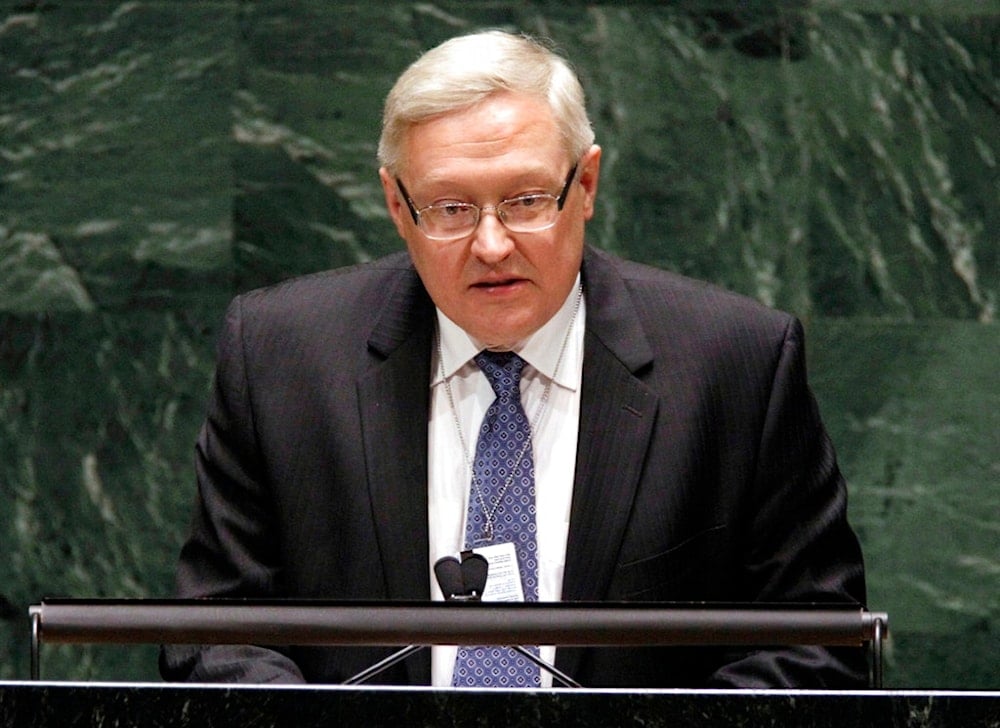Russian officials reiterate offer to facilitate US-Iran nuclear talks
Russia's Deputy FM says Moscow is ready to provide political and practical assistance to help Tehran and Washington reach a nuclear agreement.
-

In this May 4, 2010, file photo, Sergei Ryabkov speaks at the United Nations headquarters (AP, File)
Russia is prepared to offer both political and practical assistance to facilitate renewed nuclear talks between Tehran and Washington, Russian Deputy Foreign Minister Sergey Ryabkov announced on Wednesday.
Speaking to reporters, Ryabkov emphasized that despite current tensions, there remains an opportunity to reach a settlement.
“The moment has not been completely missed,” he said, signaling Russia’s commitment to diplomatic efforts aimed at reducing nuclear-related tensions in the region.
Removal of excess Iranian nuclear fuel
Ryabkov stressed that Russia is not limiting its involvement to offering political ideas. Instead, it is willing to provide hands-on support that could help bridge the gaps between Tehran and Washington.
Among the specific steps Russia is prepared to take is the removal of excess nuclear material produced by Iran, the Russian diplomat indicated, explaining that this material would be transferred for conversion into fuel usable in civilian nuclear reactors, aligning with non-proliferation goals.
With nuclear diplomacy between Iran and the United States at a standstill, Moscow’s offer may present a rare opportunity to rekindle meaningful dialogue.
Iran has full right to enrich uranium: Ulyanov to Al Mayadeen
Similarly, Russia’s envoy to the International Atomic Energy Agency (IAEA), Mikhail Ulyanov, affirmed Moscow’s readiness to mediate between Tehran and Washington in an effort to reach a political solution to the Iranian nuclear program crisis.
Speaking to Al Mayadeen on Wednesday, Ulyanov stated that past experience has shown "Russia has, on several occasions, successfully played a constructive role as a mediator in US-Iran relations, when requested by both sides."
He added that the same applies to current talks with the new US administration, expressing Moscow’s willingness to act as “an honest broker.”
In this context, the Russian diplomat stressed that the core issue at this stage is finding a solution to the uranium enrichment dispute.
He emphasized that “Iran has the full right to enrich uranium, as it is a signatory to the Treaty on the Non-Proliferation of Nuclear Weapons.”
Read more: Grossi says Iran transparent, no proof of nuclear militarization
US-sponsored draft resolution before IAEA Board heightens tensions
In a related context, Ulyanov accused the E3 (Britain, France, and Germany) of obstructing previous negotiations with Iran aimed at reviving the Joint Comprehensive Plan of Action (JCPOA), the 2015 nuclear deal.
He accused these countries of "continuously escalating the situation, including during IAEA Board of Governors sessions."
The Russian diplomat noted that the upcoming session will feature a resolution “sponsored by the United States,” adding that such a move “will not help resolve the existing issues and will most likely contribute to heightened tensions.”
During the IAEA's Board of Governors meeting in Vienna this week, Western states led by the US, UK, France, and Germany are expected to propose a censure resolution accusing Iran of non-cooperation, potentially triggering the previously suspended snapback sanctions mechanism.
The Russian officials' remarks come ahead of the sixth round of indirect nuclear talks between the US and Iran, during which Tehran is expected to present its stance on the written proposal submitted by the American side, according to Iranian Deputy Foreign Minister for Political Affairs, Majid Takht-Ravanchi.
Iran reaffirms uranium stance ahead of 6th round of indirect US talks
On Tuesday, Ravanchi made it clear that Iran’s response will be a firm rejection “if the American side raises the issue of halting uranium enrichment in the way it is being publicly presented.”
The longtime foes have held five rounds of negotiations since April, the highest level contact since President Donald Trump withdrew Washington from a 2015 nuclear accord during his first term.
On May 31, after the fifth round of talks, Iran said it had received "elements" of a US proposal for an agreement, which Iranian Foreign Minister Abbas Araghchi has criticized for its "ambiguities".
Tehran has said the offer failed to include issues raised in previous negotiations, including the lifting of sanctions, a key demand for Tehran.
Iran would present 'reasonable, logical and balanced' counter-proposal.
On Monday, Foreign Ministry spokesman Esmaeil Baqaei said Iran would present a "reasonable, logical and balanced" counter-proposal.
Trump said that the next round of talks could make it clear if a nuclear deal is possible to avoid military action.
In a key sticking point, Tehran has defended its right to enrich uranium as "non-negotiable", while Washington called any Iranian enrichment a "red line".
Iran currently enriches uranium to 60%, far above the 3.67-percent limit set in the 2015 deal and close though still short of the 90% needed for a nuclear warhead.
Western countries, including the US and its ally "Israel", have long accused Iran of seeking to acquire atomic weapons, while Tehran insists its nuclear program is for peaceful purposes.
Read more: IAEA leaked to 'Israel' confidential communications with Iran: Fars

 5 Min Read
5 Min Read










